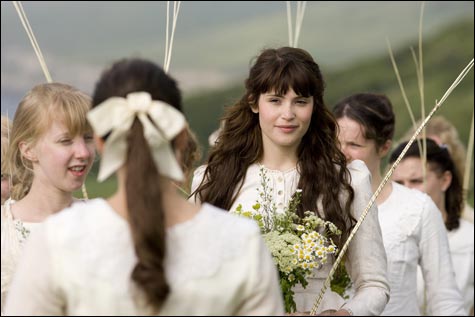
A PURE WOMAN: Gemma Arterton gives us good Tess, bad Tess, and everything in between. |
Olga Kurylenko may have snagged the #1 Bond Girl role in Quantum of Solace, but it was Gemma Arterton's Strawberry Fields who made the lasting impression, first shepherding Daniel Craig's 007 about in a Burberry and boots and seemingly not much else, then turning up sprawled Goldfinger-naked on his bed in the year's heaviest-handed film allusion. Arterton was on screen for barely 10 minutes, but in the new BBC version of Thomas Hardy's Tess of the d'Urbervilles that airs on WGBH this Sunday and next (January 4 + 11 at 9 pm), she's on for almost the entire four hours, and she makes it the rare 19th-century-novel adaptation that doesn't seem populated by 20th/21st-century time travelers.
Any film/TV adaptation of Hardy is in fact rare: over the past 50 years, his big five — Far from the Madding Crowd, The Return of the Native, The Mayor of Casterbridge, Tess, and Jude the Obscure — have spawned just 10 treatments, only three of them theater releases (Far from the Madding Crowd in 1967, Tess in 1978, Jude in 1996). The novels are long (even four hours is hardly enough for the 450-page Tess), the later ones are downbeat (Tess is hanged, Jude and Casterbridge mayor Michael Henchard die in ignominy), and Hardy's personal observations resist visual translation. (They generally get swapped out for stunning vistas of his native Dorset.) Tess (1891) is a grimmer version of Far from the Madding Crowd (1874), with Tess a poorer and more vulnerable Bathsheba Everdene, Angel Clare a more priggish and less capable Gabriel Oak, and Alec d'Urberville a less principled and more reprobate Sergeant Troy. Hardy also describes Tess as his Mary Magdalene: after she's been seduced/raped by Alec, she falls for parson's son Angel, but he's not enough of a man to forgive her her sin, or to save her from falling back into Alec's clutches.
It's not only Tess who's tempted: Hardy wrote (at the last minute) on the draft title page "A PURE WOMAN, faithfully presented," prompting readers then and now to see her as his tragic heroine, the victim of poverty, patriarchy, and puritanism. But Tess's real tragedy is her human nature. Part of her wants to be Teresa d'Urberville rather than plain Tess Durbeyfield; that's why it's just as well that Hardy wasn't permitted to be more specific about how she came to be "Maiden No More" after her night in the Chase with Alec. And like Michael Henchard, she has a self-destructive streak. It's this ambiguity, this complexity, that Arterton conveys. With her broad face and high cheekbones and peony lips, an unlearned stammer here and a self-righteous toss of the head there, she's a English country-innocent version of Nastassja Kinski's French urban sophisticate in Roman Polanski's 1979 film. You get Tess's virtues, her shortcomings, and everything in between.